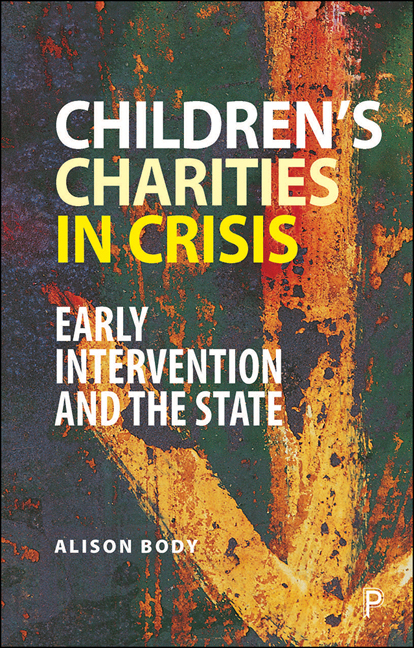Book contents
- Frontmatter
- Dedication
- Epigraph
- Contents
- List of Figures and Tables
- About the Author
- Acknowledgements
- Introduction
- Part I Preventative Services and Children’s Charities: Policy and Paradigm Shifts
- Part II On the Frontline of Early Intervention
- Part III The Lived Realities of Commissioning Children’s Early Intervention Services
- Part IV Concluding Thoughts
- Appendix: Data and Methods: Voices from the Frontline
- References
- Index
7 - Partnership Working, Securing Advantage and Playing the Game: Thriving, not Just Surviving
Published online by Cambridge University Press: 04 March 2021
- Frontmatter
- Dedication
- Epigraph
- Contents
- List of Figures and Tables
- About the Author
- Acknowledgements
- Introduction
- Part I Preventative Services and Children’s Charities: Policy and Paradigm Shifts
- Part II On the Frontline of Early Intervention
- Part III The Lived Realities of Commissioning Children’s Early Intervention Services
- Part IV Concluding Thoughts
- Appendix: Data and Methods: Voices from the Frontline
- References
- Index
Summary
Commissioning is a game and we don't make the rules, that's way above our heads, but if you want to work for and provide services on behalf of the authority you must play that game and find ways to get around the issues. (Commissioner)
Introduction
As the commissioning culture has matured within the public sector, so too have the responses from children's charities. As explored in previous chapters in this book, commissioning and policies regarding charitable sector engagement are full of multiple contradictions, confusion and complexity. Within this, we have seen two major opposing schools of thought manifest themselves. One, often driven by politicians and social policy decision makers, advocates for the commissioning and competition agenda as increasing choice and diversifying services by placing them outside of the public sector (for example, Sturgess et al, 2011; Blatchford and Gash, 2012). Another view, often pushed by academics and practitioners, which is more critical, argues that commissioning is leading to the marketisation and privatisation of services (for example, Davies, 2008; Milbourne, 2009). Many children's charities, and indeed commissioners, feel inhibited by these difficulties, although we also identify a group of children's charities, supported by particular commissioners, who ‘play the game’, reinterpreting rules, and at times breaking rules, to secure what they consider the best outcomes for children. This dedication to securing their own, individual ideological bias, sets them apart from other actors in the field of early intervention and preventative services, and warrants further attention.
As we suggest earlier on in this book, while many children's charities experience significantly negative effects of commissioning, several children's charities have successfully negotiated a pathway between conformity and dissent. As a result, they have successfully negotiated contracts and tenders to their advantage or even bypassed commissioning processes altogether, to secure a mutually developed contract. This included small-scale grants which were considered to ‘go under the radar’ (Commissioner) to large-scale contracts. This survival does not happen in isolation, but instead requires a relational approach in which some children's charities deploy a range of tactics to secure additional advantage, while some commissioners ‘bend the rules’ to facilitate advantage for certain children's charities who they believe will deliver a ‘better’ service for children.
- Type
- Chapter
- Information
- Children's Charities in CrisisEarly Intervention and the State, pp. 177 - 206Publisher: Bristol University PressPrint publication year: 2020



